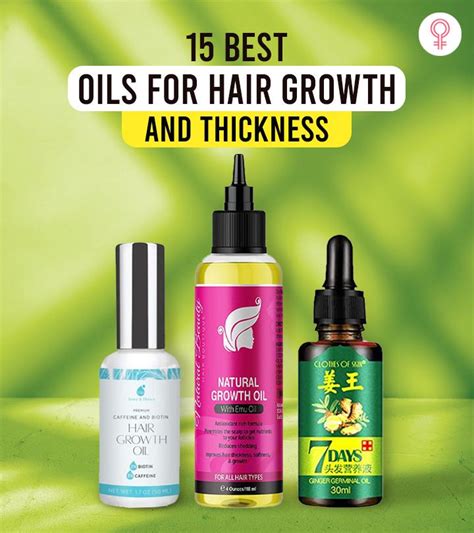Introduction
Hair, a defining attribute of human appearance, is a complex biological structure composed primarily of keratin, a fibrous protein. Maintaining healthy and lustrous hair is a pursuit shared by individuals of all ages and cultures. One aspect of hair care that has garnered significant attention is the use of oils to promote growth and thickness. This article aims to delve into the world of hair oils, examining their potential benefits, exploring different types, and deciphering which oil stands as the most effective for enhancing hair growth and thickness.

The Science Behind Hair Growth
To understand the impact of oils on hair growth, it is essential to grasp the underlying science behind this process. Hair growth occurs in a cyclical pattern involving three distinct phases:
1. Anagen Phase (Active Growth Phase): This phase, lasting for 2-6 years, is characterized by rapid hair growth from the hair follicle.
2. Catagen Phase (Transitional Phase): Lasting for 2-3 weeks, this phase marks the end of active growth, as the hair follicle detaches from the blood supply.
3. Telogen Phase (Resting Phase): This phase lasts for approximately 3-4 months, during which the hair follicle remains inactive, and the hair shaft is gradually pushed out by the new hair growing beneath it.
Benefits of Oils for Hair Growth
Oils have been traditionally used for hair care due to their inherent properties that can benefit hair growth and thickness. These benefits include:
1. Moisturizing: Oils help replenish the natural oils present in the hair, preventing dryness and promoting hair hydration.
2. Nourishing: Oils are rich in nutrients, such as vitamins, minerals, and fatty acids, which can nourish the hair follicles and stimulate growth.
3. Scalp Conditioning: Oils can soothe an irritated scalp, reduce inflammation, and promote a healthy scalp environment conducive to hair growth.
4. Strengthening: Oils can strengthen hair shafts, reducing breakage and promoting thicker, fuller hair.
Types of Oils for Hair Growth
Numerous oils have been touted for their potential to enhance hair growth. Some of the most popular and well-researched options include:
1. Coconut Oil: Coconut oil is a rich source of lauric acid, which has been shown to penetrate the hair shaft and nourish it from within.
2. Argan Oil: Argan oil is abundant in antioxidants, such as vitamin E, which help protect hair from damage and promote growth.
3. Olive Oil: Olive oil is rich in oleic acid, which can penetrate the hair shaft and strengthen it, reducing breakage.
4. Castor Oil: Castor oil is high in ricinoleic acid, which has antibacterial and antifungal properties that can promote scalp health and reduce hair loss.
Determining the Best Oil for Hair Growth
While various oils offer benefits for hair growth, determining the best oil for an individual depends on several factors, including:
1. Hair Type: Different hair types have unique needs. For example, dry hair may benefit from more moisturizing oils like coconut oil, while oily hair may prefer lighter oils like argan oil.
2. Scalp Condition: Oils that soothe the scalp, such as castor oil, may be more effective for individuals with scalp irritation or dandruff.
3. Personal Preference: Ultimately, the best oil for hair growth is the one that works best for the individual. Experimenting with different oils and observing their effects on hair growth and scalp health can help determine the most suitable option.
Effective Strategies for Using Oils for Hair Growth
To maximize the benefits of oils for hair growth, it is crucial to use them effectively. Here are some recommended strategies:
1. Hot Oil Treatment: Warming the oil slightly before applying it can enhance its absorption into the hair and scalp.
2. Overnight Application: Leaving oil in the hair overnight allows it to penetrate deeply and nourish the hair follicles for an extended period.
3. Scalp Massage: Massaging the scalp with oil can promote blood circulation and stimulate hair follicles.
4. Regular Use: Consistency is key. Regular use of hair oils, at least once or twice a week, is essential for noticeable results.
FAQs
1. Can oils alone promote hair growth? Oils can contribute to hair growth by providing nourishment and a healthy scalp environment, but they are not a standalone solution for significant hair loss.
2. How long does it take to see results from using hair oils? Results vary depending on the individual and the oil used. Some may notice improvements within a few weeks, while others may require several months of consistent use.
3. Can I apply oil to wet hair? It is generally not recommended to apply oil to wet hair, as it can prevent the oil from penetrating the hair shaft effectively.
4. What are the side effects of using hair oils? Most hair oils are generally safe, but some people may experience scalp irritation or allergic reactions to certain oils. It is always advisable to do a patch test before applying any new oil to the entire scalp.
Conclusion
The quest for thicker, healthier hair has led to the exploration of various oils for their potential benefits in promoting hair growth. While no single oil is universally hailed as the best, certain oils, such as coconut oil, argan oil, olive oil, and castor oil, have demonstrated promising results. The key to unlocking the power of these oils lies in understanding the individual’s hair needs, scalp condition, and personal preferences. By incorporating effective application strategies and maintaining consistency, individuals can harness the benefits of hair oils and embark on a journey towards fuller, more vibrant locks.
